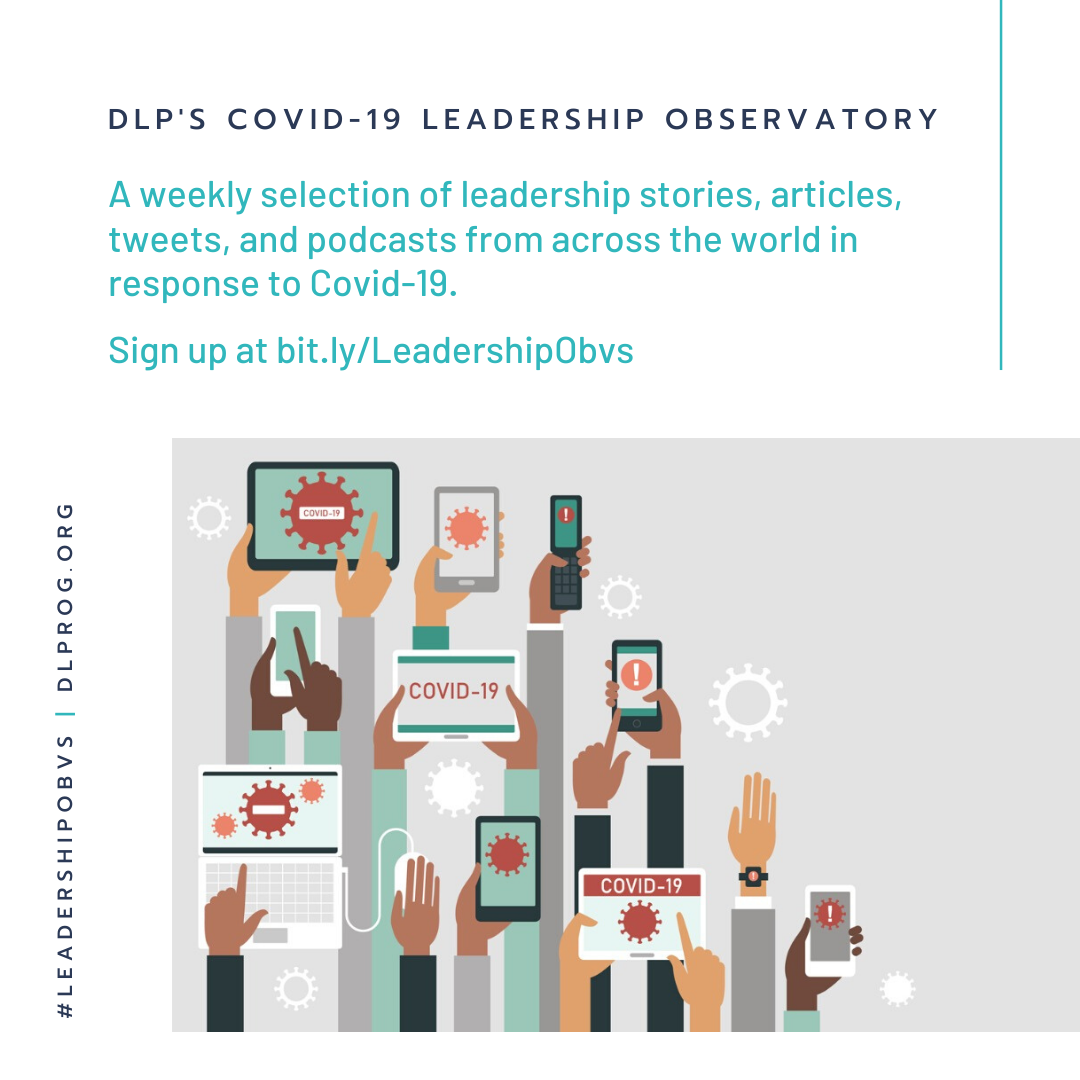During the Covid-19 pandemic, DLP remains committed to supporting leadership, wherever it may be, by helping the flow of knowledge and experience between practitioners, policymakers and researchers. DLP’s weekly #LeadershipObvs collects and summarises all of the leadership focussed resources that we have found most useful for understanding developmental leadership during the crisis – whether they be reports, articles, tweets, videos, podcasts, blogs or other. Covering everything from the challenges of leadership, how to navigate the current conjuncture, how to support processes of leadership, or looking to the future of leadership. Each Observatory is a five-minute read summarising and linking to some of the most helpful work on leadership that week.
Helen Sullivan, ‘Leading in and out of the crisis’, Policy Forum, 18 May 2020.
Sullivan shares five steps to support effective leadership in the transition from responding to crisis to a post-crisis planning phase. By encouraging policymakers to lead ethically, reduce the speed of decision making, practice humility, match expertise with compassion, and lead as oneself. Without these actions, leaders risk falling into the ‘reckless’ category of leadership, whereas Sullivan argues that resilient leaders are required to consider the ‘what next?’ question, as societies and economies are reimagined.
#LeadershipObvs in a nutshell: Leading effectively beyond COVID-19 requires leaders to prioritise ethical leadership, slow down and seek out alternative views.
Laura Spinney, ‘The coronavirus slayer! How Kerala’s rock star health minister helped save it from COVID-19’, The Guardian, 14 May 2020.
Thirty-five million citizens live in Kerala, India, which has reported four COVID-19 related deaths. The quick actions of Kerala’s health minister, a former teacher, prevented any community transmission. In an interview with Shailaja, Spinney documents the action plan, leadership and approach taken to reduce the spread of COVID-19. By responding quickly to trusted health advice from the World Health Organisation to test, trace, isolate, and support, the virus transmission was reduced.
#LeadershipObvs in a nutshell: Lessons from Kerala: Trusting medical advice and acting swiftly prevented community transmission in India.
Kate Sutton, ‘What ‘good’ COVID-19 leadership looks like, according to experts responding to the pandemic and a tropical cyclone’, Australia Awards Women’s Leadership Institute, 11 May 2020.
In a panel discussion chaired by Sutton, hosted by Australia Awards and Humanitarian Advisory Group, brought Pacific women together to discuss ‘good’ leadership in the Pacific. Adi Vasiti Radinivuna Soko of the National Disaster Management Office, Fiji, Emeline Siale Ilolahia of Piango, and Pamela Toliman in Papua New Guinea were part of the discussion. Women regularly consider the needs of society’s most vulnerable groups when planning a crisis response. This event summary identifies good leadership practices witnesses in the Pacific – from a female perspective. Effective communication continues to appear as a critical asset for good leadership, alongside considering the variation of personal needs and empowering citizens to take action to protect themselves against COVID-19, by providing reliable health information. When leaders provide adequate knowledge, citizens will choose to practice proper social distancing and handwashing to look after their families, and demonstrate economic resilience by going back to work where possible.
#LeadershipObvs in a nutshell: COVID-19 provides an opportunity for leaders to overhaul health systems, develop community engagement, and push back against gender inequality.
Lina Srivastava, ‘Post-Pandemic Recovery Will Need Women’s Leadership. Then Again, When Haven’t We?’, MS Magazine, 19 May 2020.
Women face daily challenges with overcoming adversity, which can be exacerbated during the COVID-19 pandemic. In this blog, Srivastava encourages policymakers, decision-makers and funders to support, female-led, community-facing organisations. Srivastava argues that now is precisely the time to commit new resources to close the gender gap, through the creation of better access to public platforms, investing in projects and increasing equality amongst organisational leadership structures.
#LeadershipObvs in a nutshell: Decision-makers need to address inequalities in race, gender, and class inclusion within organisational leadership to build back better.
Nematullah Bizhan, ‘Fragile states need support to fight COVID-19’, Devpolicy, 19 May 2020.
Conflict is preventing fragile states from effectively controlling the COVID-19 virus, as the implications of quickly imposed lockdown restrictions are realised. Bizhan calls for more international leadership and cooperation to return the flow of aid to pre-COVID-19 levels with further support for debt relief programmes. With the trajectory of the virus in fragile states unknown, developed countries are encouraged to enhance their support.
#LeadershipObvs in a nutshell: International actors must lead and cooperate to ensure fragile states receive essential support.
Sign up to receive the #LeadershipObvs directly to your inbox
A full list of leadership resources
Other resources are available on Twitter using #LeadershipObvs @DLProg











